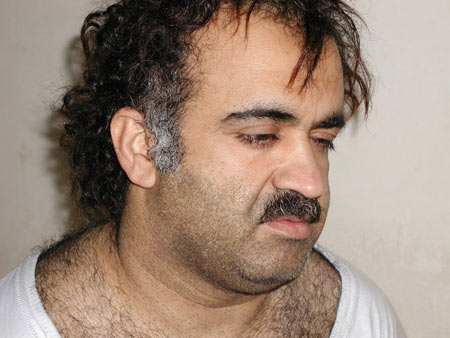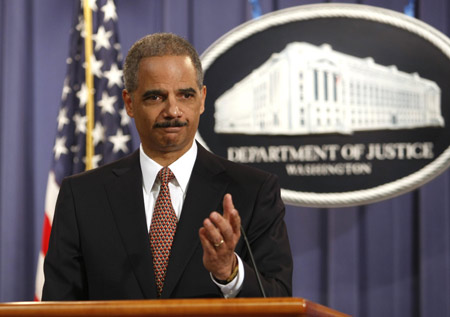US to try five 9/11 suspects in New York
The Obama administration announced a decision on Friday to have five conspirators of the 9/11 terror attacks tried in New York, reigniting a debate on the planned closure of the Guantanamo prison.
|
|
|
This photo obtained in March 2003 shows Khalid Sheikh Mohammed, alleged organizer of the September 11, 2001, attacks, shortly after his capture. Sheikh Mohammed, the alleged 9/11 mastermind, and four co-accused will be tried in a civilian court in New York just blocks from where Al-Qaeda hijackers crashed two airliners into the World Trade Center, the government announced Friday. |
DEATH PENALTY TO BE SOUGHT
U.S. Attorney General Eric Holder told reporters at a Washington news conference that the self-proclaimed 9/11 mastermind Khalid Sheikh Mohammed, and four co-conspirators will be transferred from the U.S. military detention facility at Guantanamo Bay, Cuba to the U.S. District Court for the Southern District of New York for trials.
|
|
|
U.S. Attorney General Eric Holder fields a question during a news conference in Washington November 13, 2009. [Xinhua/Reuters File Photo] |
The court is just blocks away from the former World Trade Center twin towers that were destroyed by the strike of two hijacked commercial flights on Sept. 11, 2001.
Saying the five suspects will "finally face justice," Holder made it clear that the government will seek death penalty against them.
"I fully expect to direct prosecutors to seek the death penalty against each of the alleged 9/11 conspirators," he said.
Holder said he is confident the trials will result in conviction.
"I would not have authorized prosecution if I was not confident our outcome would be a successful one," he told reporters.
Holder added that the five suspects will only be brought to New York after all legal obligations have been fulfilled, including a required 45-day notice and report to Congress.
He said he has met with Governor David Paterson and Mayor Michael Bloomberg to discuss security and other issues.
Holder also said five other Guantanamo detainees will go on trials in the military commissions at the prison. Among them are Abd al-Rahim al Nashiri, accused of organizing the 2000 attack on the U.S. warship Cole in Yemen, and Omar Khadr, a Canadian charged with the 2002 murder of a U.S. military officer in Afghanistan.
GUANTANAMO DEBATE REVIVED
Transferring the five 9/11 suspects from Guantanamo to U.S. soil for trials marks a key step forward for U.S. President Barack Obama's plan to close the notorious prison, but it also reignited a fierce debate on whether Guantanamo detainees should be brought onto U.S. soil.
U.S. Senator John Cornyn, a Texas Republican, issued a statement to denounce the government's decision, saying the Obama administration is "reverting to a pre-9/11 approach to fighting terrorism and bringing these dangerous individuals onto U.S. soil," which "needlessly compromises the safety of all Americans."
Peter King, a Republican Congressman from New York, said the decision makes the city more of a target.
Michael Anton, an aide for former president George W. Bush, claimed that Mohammed's lawyers "will work hard to ensure that his trial is all about what he 'endured' at the hands of the U.S. government, and not at all about what he inflicted on the American people."
He also said the trial will be politically motivated.
"They will strive to put in the dock George W. Bush, Dick Cheney, George Tenet, John Yoo, the CIA, and the United States government and the American people," he claimed.
On the other side of the debate, advocates for closing the Guantanamo prison and some family members of the 9/11 victims welcomed the government's decision.
Tom Andrews, director of a campaign to close the Guantanamo prison, said: "As long as Guantanamo remains open, America's imageabroad will continue to be one of torture and our ability to lead will be hampered."
He also rejected the Republican denouncement of the decision as "fear-based attacks by right-wing critics of President Obama."
Kristen Breitweiser, whose husband was killed in the 9/11 attacks, applauded the decision.
"Some would say New York would now be a target by allowing Mohammed's trial to take place in New York, but I disagree," she told CNN.
"Our ability to prosecute terrorists successfully in open courtrooms has less to do with our judicial process and more to do with Bush's policy on torture that will make these prosecutions more difficult," said Breitweiser.
POLITICAL STAKES RAISED
Analysts said given the challenges facing Obama's plan to close the Guantanamo prison, Friday's decision could dramatically raise the political stakes for the president on the issue.
Since the former Bush administration opened the prison in 2002 to detain terror suspects captured in the "war on terror," it has been the target of numerous protests and criticism worldwide for its harsh treatment of the detainees and dubious legal proceedings.
After taking office in January, Obama set a deadline of Jan. 22,2010 to close the prison, part of his efforts to restore the U.S. image.
But the most controversial part of his plan is how to relocate the prisoners after the prison is closed.
Among the 215 prisoners still being held at Guantanamo, about 80 have been approved for release and another 60 will face trial.
The rest are deemed not fit for trial but too dangerous to be released.
Obama has proposed to bring some of the Guantanamo detainees to U.S. soil for trial or imprisonment, but these ideas have met with strong opposition from U.S. public and lawmakers.
The Senate voted in May to block the funds the president requested for closing the prison, saying he has to present a more detailed plan for the closure first.
Last month, the U.S. House of Representatives approved only limited transfer of Guantanamo prisoners onto U.S. soil.
It allows Guantanamo detainees to be sent to U.S. soil only if they are facing trial, and forbids releasing these detainees onto U.S. soil.
However, if detainees are brought onto U.S. soil for trials in civilian courts, there is always a possibility that they can be exonerated.
Even though the 9/11 suspects are set to be convicted given the charges against them, some fear the public trials could become platforms for the suspects to announce their extremist ideology, or veers off course in an unexpected way.
Moreover, the uncertainties surrounding the trials could embolden Obama's political opponents to claim his Guantanamo closure plan is undermining national interests, at a time when the U.S. public is still deeply skeptical about the idea of bringing any Guantanamo prisoners onto U.S. soil, analysts said.
 0 Comments
0 Comments









Comments